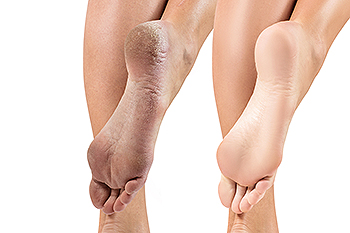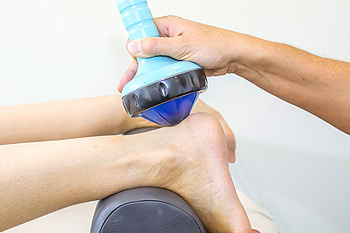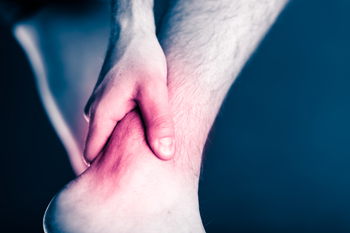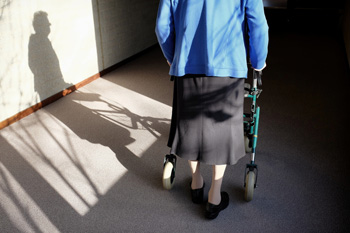Glen Allen Office
(804) 747-3380

Dried out skin on the heels can crack when weight is placed on them and the fat pad in the heels spread. This is a condition known as cracked heels. Cracked heels can vary in severity from mild to severe. Left untreated, some cracked heels can deepen and worsen to the point of pain, bleeding, and even infection. A person is more prone to developing cracked heels if they do not take care of cleaning and moisturizing their heels, if they stand for excessive amounts of time, wear open-back shoes, or walk barefoot frequently. Being overweight can be a contributing factor to the formation of cracked heels, as can certain medical conditions that dry out skin. Certain water-retaining creams applied nightly can sometimes help avoid cracked heels from developing. If you have cracked heels that are not responding to at-home treatment, or you have diabetes and cannot treat them by yourself, it is suggested you contact a podiatrist.
Cracked heels are unsightly and can cause further damage to your shoes and feet. If you have any concerns, contact one of our podiatrists from The Podiatry Center. Our doctors can provide the care you need to keep you pain-free and on your feet.
Cracked Heels
Cracked heels appear unappealing and can make it harder for you walk around in sandals. Aside from looking unpleasant, cracked heels can also tear stockings, socks, and wear out your shoes. There are several methods to help restore a cracked heel and prevent further damage.
How Do You Get Them?
Dry skin is the number one culprit in creating cracked heels. Many athletes, walkers, joggers, and even swimmers suffer from cracked heels. Age and skin oil production play a role to getting cracked heels as well.
Promote Healing
Over the counter medicines can help, especially for those that need instant relief or who suffer from chronic dry feet.
Wear Socks – Wearing socks with medicated creams helps lock in moisture.
Moisturizers – Applying both day and night will help alleviate dryness which causes cracking.
Pumice Stones – These exfoliate and remove dead skin, which allows for smoother moisturizer application and better absorption into the skin.
Change in Diet
Eating healthy with a well-balanced diet will give the skin a fresh and radiant look. Your body responds to the kinds of food you ingest. Omega-3 fatty acids and zinc supplements can also revitalize skin tissue.
Most importantly, seek professional help if unsure how to proceed in treating cracked heels. A podiatrist will help you with any questions or information needed.
If you have any questions, please feel free to contact one of our offices located in Richmond and Glen Allen, VA . We offer the newest diagnostic and treatment technologies for all your foot care needs.

There are many tools at a podiatrist’s disposal to address any number of challenging foot afflictions. Podiatrists may prescribe antibiotics, recommend orthotics, or encourage a surgical procedure in extreme cases. One interesting tool that podiatrists can use is known as shockwave therapy for the feet. This new method can be used to treat plantar fasciitis, one of the most common foot conditions affecting individuals across the country. The shockwave therapy treatment consists of applying bursts of air and electromagnetic shock pulses to the lower limbs in either low or high energy increments. The purpose of this is to facilitate a kind of natural healing response in the feet. That is, the shockwave therapy is meant to encourage the formation of blood vessels in the affected areas and other healing nutrients. If you have plantar fasciitis and believe that you might be interested in addressing it through shockwave therapy, contact a podiatrist who may be able to help.
Shockwave therapy is a treatment commonly used to treat various injuries and conditions, particularly plantar fasciitis in the feet. To learn more, consult with one of our podiatrists from The Podiatry Center. Our doctors can provide the care you need to keep you pain-free and on your feet.
Shockwave Therapy
Shockwave therapy is a new treatment option designed to treat bone conditions such as tennis elbow, shoulder pain, and others. Shockwave therapy uses high intensity sound waves that are directed to the affected tissues of the body with pinpoint accuracy. The effects are very beneficial, leading to a production of collagen fibers, eliminating inflammation.
Who Benefits from Shockwave?
Shockwave is recommended for patients suffering from heel pain and associated problems. Heel pain is a common condition which can be caused by obesity, overexertion, and spending a substantial amount of time on hard floors with your feet exposed and unsupported.
Fast and Easy
The therapy is actually a simple process that can leave patients feeling better the very next day. Shockwave therapy is not as dramatic as it sounds. It enables more blood flow to effected areas, addressing the source of the problem and allowing treatment to last for a long time.
Treatment & Recovery Time
Shockwave treatment will enable your feet to recover quickly. This is especially important since surgery is not required. It is cost effective and does not require the use of anesthesia. This treatment is a better option to surgery, since it is proven safe.
If you have any questions, please feel free to contact one of our offices located in Richmond and Glen Allen, VA . We offer the newest diagnostic and treatment technologies for all your foot and ankle needs.

The Achilles tendon is responsible for pointing and flexing the foot, which is necessary in walking and running. It is located at the back of the heel, and connects the calf muscles to the heel. An Achilles tendon injury can occur from increasing speed and distance too quickly while running, or not properly warming up and cooling down. A tear may occur, and if the rupture is partial, the tendon remains attached to the calf muscle. A complete tear, where there is no connection between the tendon and muscle, is known as a rupture, and it is very painful and difficult to walk. This can happen as a result of high levels of stress put on the Achilles tendon from participating in activities that can include tennis, basketball, and football. There may be existing medical conditions and medications that can weaken the Achilles tendon and contribute to enduring an injury, such as Cushing’s syndrome, prednisolone, and ciprofloxacin. Common symptoms that many patients experience can be the inability to stand on their tiptoes, and there may be a flat-footed walking style. An Achilles tendon injury can be treated in different ways, and it is suggested that you urgently consult the expertise of a podiatrist who can determine what is best for you.
Achilles tendon injuries need immediate attention to avoid future complications. If you have any concerns, contact one of our podiatrists of The Podiatry Center. Our doctors can provide the care you need to keep you pain-free and on your feet.
What Is the Achilles Tendon?
The Achilles tendon is a tendon that connects the lower leg muscles and calf to the heel of the foot. It is the strongest tendon in the human body and is essential for making movement possible. Because this tendon is such an integral part of the body, any injuries to it can create immense difficulties and should immediately be presented to a doctor.
What Are the Symptoms of an Achilles Tendon Injury?
There are various types of injuries that can affect the Achilles tendon. The two most common injuries are Achilles tendinitis and ruptures of the tendon.
Achilles Tendinitis Symptoms
Rupture Symptoms
Treatment and Prevention
Achilles tendon injuries are diagnosed by a thorough physical evaluation, which can include an MRI. Treatment involves rest, physical therapy, and in some cases, surgery. However, various preventative measures can be taken to avoid these injuries, such as:
If you have any questions please feel free to contact one of our offices located in Richmond and Glen Allen, VA . We offer the newest diagnostic tools and technology to treat your foot and ankle needs.
 As people age, they are at an increasing risk of suffering a dangerous fall. However, there are several ways in which seniors can prevent trips and tumbles by focusing on their feet. Specifically, seniors can practice simple, isolated foot exercises to strengthen their muscles and improve stability. First, a senior can practice heel-toe walking by slowly placing one foot directly in front of the other in succession, making sure that each time the heel is placed up against the other foot’s toes. It might be helpful to extend the arms horizontally at one’s sides or lightly touch a wall for extra balance. Additionally, a senior may perform foot taps, where one stands at the bottom of a staircase with their feet hip-width apart and slowly raises each foot to gently tap the top of the bottom stair. One can alternate feet each time to help build stability and balance. Each of these exercises can be performed three to five times per week. A senior might even consider performing these exercises with the help of a friend or loved one. A podiatrist can give you more tips about improving balance to prevent falls.
As people age, they are at an increasing risk of suffering a dangerous fall. However, there are several ways in which seniors can prevent trips and tumbles by focusing on their feet. Specifically, seniors can practice simple, isolated foot exercises to strengthen their muscles and improve stability. First, a senior can practice heel-toe walking by slowly placing one foot directly in front of the other in succession, making sure that each time the heel is placed up against the other foot’s toes. It might be helpful to extend the arms horizontally at one’s sides or lightly touch a wall for extra balance. Additionally, a senior may perform foot taps, where one stands at the bottom of a staircase with their feet hip-width apart and slowly raises each foot to gently tap the top of the bottom stair. One can alternate feet each time to help build stability and balance. Each of these exercises can be performed three to five times per week. A senior might even consider performing these exercises with the help of a friend or loved one. A podiatrist can give you more tips about improving balance to prevent falls.
Preventing falls among the elderly is very important. If you are older and have fallen or fear that you are prone to falling, consult with one of our podiatrists from The Podiatry Center. Our doctors will assess your condition and provide you with quality advice and care.
Every 11 seconds, an elderly American is being treated in an emergency room for a fall related injury. Falls are the leading cause of head and hip injuries for those 65 and older. Due to decreases in strength, balance, senses, and lack of awareness, elderly persons are very susceptible to falling. Thankfully, there are a number of things older persons can do to prevent falls.
How to Prevent Falls
Some effective methods that older persons can do to prevent falls include:
Falling can be a traumatic and embarrassing experience for elderly persons; this can make them less willing to leave the house, and less willing to talk to someone about their fears of falling. Doing such things, however, will increase the likelihood of tripping or losing one’s balance. Knowing the causes of falling and how to prevent them is the best way to mitigate the risk of serious injury.
If you have any questions, please feel free to contact one of our offices located in Richmond and Glen Allen, VA . We offer the newest diagnostic and treatment technologies for all your foot care needs.